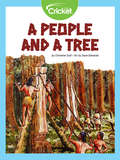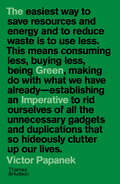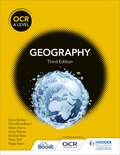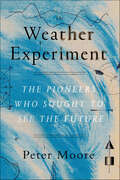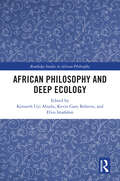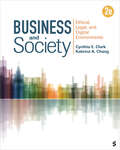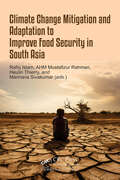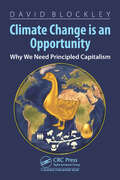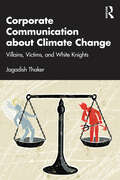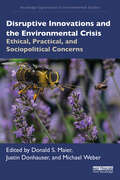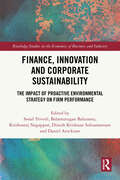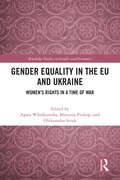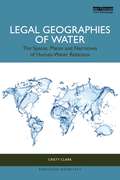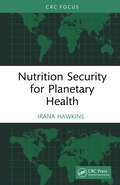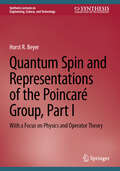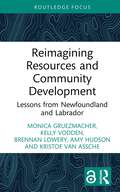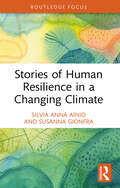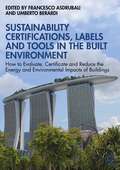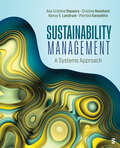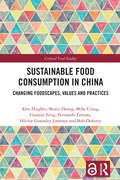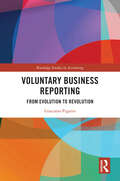- Table View
- List View
A People and a Tree
by Christine GrafNative American tribes from the Northwest Coast learned to use the wood of cedar trees for many of their daily needs. Tribes used recycling to conserve resources hundreds of years ago. Pounding bark until it was fluffy to make diapers and with special thin branches called withes, cedar trees were soaked and used to make rope. What special technique did tribes use to take down big cedar trees?
After the Ice Age: The Return of Life to Glaciated North America
by E. C. PielouThe fascinating story of how a harsh terrain that resembled modern Antarctica has been transformed gradually into the forests, grasslands, and wetlands we know today. "One of the best scientific books published in the last ten years. "-Ottowa Journal "A valuable new synthesis of facts and ideas about climate, geography, and life during the past 20,000 years. More important, the book conveys an intimate appreciation of the rich variety of nature through time. "-S. David Webb,Science
The Green Imperative: Ecology and Ethics in Design and Architecture
by Victor PapanekA fresh edition of the sustainable design pioneer Victor Papanek’s classic and ever-relevant book examining the important role of design in combating climate change. Whether it’s horror at the plastic littering the world’s beaches or despair at the melting polar ice caps, the world is gradually waking up to the impending climate disaster. In The Green Imperative, Papanek argues for design that addresses these issues head-on. This means using materials that can be recycled and reused, no more pointless packaging, thinking about how products make us feel and engage all our senses, putting nature at the heart of design, working at a smaller scale, rejecting aesthetics for their own sake, and thinking before we buy. First published at the end of the twentieth century, this book offered a plethora of honest advice, clear examples, and withering critiques, laying out the flaws of and opportunities for the design world at that time. A quarter of a century on, Papanek’s lucid prose has lost none of its verve, and the problems he highlights have only become more urgent, giving today’s reader both a fascinating historical perspective on the issues at hand and a blueprint for how they might be solved.
OCR A Level Geography Third Edition
by David Barker Nigel Yates Andy Palmer Michael Raw Peter Stiff Helen Harris Chris BroadbentHelp your students to develop the geographical skills and knowledge they need to succeed using this new Edition Student book, which includes new case studies and practice questions. Written by our expert author team, the new edition is structured to provide support for A-Level Geography learners of all abilities. The book includes:· Activities and regular review questions to reinforce geographical knowledge and build up core geographical skills· Clear explanations to help students to grapple with tricky geographical concepts and grasp links between topics· Case studies from around the world to vividly demonstrate geographical theory in action· Exciting fieldwork projects that meet the fieldwork and investigation requirementsThis student book is supported by digital resources on our new digital platform Boost, providing a seamless online and offline teaching experience.
OCR A Level Geography Third Edition
by David Barker Nigel Yates Andy Palmer Michael Raw Peter Stiff Helen Harris Chris BroadbentHelp your students to develop the geographical skills and knowledge they need to succeed using this new Edition Student book, which includes new case studies and practice questions. Written by our expert author team, the new edition is structured to provide support for A-Level Geography learners of all abilities. The book includes:· Activities and regular review questions to reinforce geographical knowledge and build up core geographical skills· Clear explanations to help students to grapple with tricky geographical concepts and grasp links between topics· Case studies from around the world to vividly demonstrate geographical theory in action· Exciting fieldwork projects that meet the fieldwork and investigation requirementsThis student book is supported by digital resources on our new digital platform Boost, providing a seamless online and offline teaching experience.
The Weather Experiment: The Pioneers Who Sought to See the Future
by Peter MooreA history of weather forecasting, and an animated portrait of the nineteenth-century pioneers who made it possibleBy the 1800s, a century of feverish discovery had launched the major branches of science. Physics, chemistry, biology, geology, and astronomy made the natural world explicable through experiment, observation, and categorization. And yet one scientific field remained in its infancy. Despite millennia of observation, mankind still had no understanding of the forces behind the weather. A century after the death of Newton, the laws that governed the heavens were entirely unknown, and weather forecasting was the stuff of folklore and superstition. Peter Moore's The Weather Experiment is the account of a group of naturalists, engineers, and artists who conquered the elements. It describes their travels and experiments, their breakthroughs and bankruptcies, with picaresque vigor. It takes readers from Irish bogs to a thunderstorm in Guanabara Bay to the basket of a hydrogen balloon 8,500 feet over Paris. And it captures the particular bent of mind—combining the Romantic love of Nature and the Enlightenment love of Reason—that allowed humanity to finally decipher the skies.
African Philosophy and Deep Ecology (Routledge Studies in African Philosophy)
by Kenneth Uyi Abudu, Kevin Gary Behrens, and Elvis ImafidonThis book investigates African philosophical contributions to the concept of deep ecology, which advocates for rethinking human and non-human relationships within our ecosystems, by promoting the inherent and earned worth of all beings.With ecological crises impacting lives around the world, this book interrogates deep ecology thinking from African philosophical perspectives, highlighting the continent’s important ontological, epistemological, ethical, aesthetic, and broad philosophical contributions. The book investigates issues such as the eco-phenomenology of human / non-human animals’ relations, Ubuntu and the environment, the superiorist fallacy, environmental belongingness, the impact of colonization and modernity on non-human trauma, the politics of ecological narrative about African places, the question of moral status, African socialist perspectives, the question of degrowth, selective subordination, biodiversity loss, land ethics, the ontology of waste, and the concept of personhood in relation to global climate and ecological justice.Providing a significant intervention in our understanding of the ecological crises and our duties toward ecosystems and the non-human other in the twenty-first century, this book is an important read for researchers, advocates and other stakeholders working in the fields of environmental philosophy, climate change, indigenous studies, and African Studies.
Business and Society: Ethical, Legal, and Digital Environments
by Cynthia E. Clark Kabrina K. ChangRecipient of a 2021 Most Promising New Textbook Award from the Textbook & Academic Authors Association (TAA) Business and Society: Ethical, Legal, and Digital Environments, Second Edition prepares students for the modern workplace by exploring the opportunities and challenges that individuals and businesses face in today′s increasingly global and digital world. Authors Cynthia E. Clark and Kabrina K. Chang present unique chapters on social media, big data and hacking, and privacy, diving deeper into the new legal and ethical challenges that are unleashed by our society′s use of and dependence on technology. Real-world case studies, ethical dilemmas, and point-counterpoint debates provide students with hands-on opportunities to apply chapter concepts and develop critical thinking skills as they explore the relationship among businesses, their stakeholders, and their shareholders. The Second Edition includes new cases and expanded coverage of global issues, the future of work, artificial intelligence and consumer rights.
Business and Society: Ethical, Legal, and Digital Environments
by Cynthia E. Clark Kabrina K. ChangRecipient of a 2021 Most Promising New Textbook Award from the Textbook & Academic Authors Association (TAA) Business and Society: Ethical, Legal, and Digital Environments, Second Edition prepares students for the modern workplace by exploring the opportunities and challenges that individuals and businesses face in today′s increasingly global and digital world. Authors Cynthia E. Clark and Kabrina K. Chang present unique chapters on social media, big data and hacking, and privacy, diving deeper into the new legal and ethical challenges that are unleashed by our society′s use of and dependence on technology. Real-world case studies, ethical dilemmas, and point-counterpoint debates provide students with hands-on opportunities to apply chapter concepts and develop critical thinking skills as they explore the relationship among businesses, their stakeholders, and their shareholders. The Second Edition includes new cases and expanded coverage of global issues, the future of work, artificial intelligence and consumer rights.
Climate Change Mitigation and Adaptation to Improve Food Security in South Asia
by Mannava Sivakumar Rafiq Islam Heulin Thierry Ahm Mustafizur RahmanBoth food security and agriculture contribute to, and are affected by, global climate change. The Intergovernmental Panel on Climate Change reports that food production systems account for up to 37% of global greenhouse gas emissions. At the same time, these systems are increasingly vulnerable to climate change, with extreme weather events such as rising temperatures, flooding, drought, secondary salinity, and land degradation threatening food security in South Asia. Additionally, the spread of weeds, pests, and diseases due to shifting climates exacerbates these challenges. The strain on agriculture and food security from accelerated climate change is further worsening by rapid population growth. Globally, more than 820 million people suffer from hunger, and by 2050, food production will need to double to meet global demands. This intensification of farming, combined with climate change, will lead to greater reliance on reactive chemicals, water, and energy inputs—potentially damaging agroecosystem services and becoming increasingly difficult to manage. South Asia, with its high population growth, is particularly vulnerable to climate impacts such as flooding, salinity, droughts, and solar dimming. Rising sea levels and coastal erosion could result in the loss of 17% of land surface and 30% of food production by 2050.Agriculture and food systems must undergo innovative transformations to address these challenges. A comprehensive Climate Change Adaption Framework is essential for fostering a supportive policy environment, sharing information on climate impacts, and adapting climate-smart agriculture to enhance food security in South Asia. This book, based on the outcomes of the 2022 International Conference on Climate Change and Food security in South Asia, held in Dhaka, Bangladesh, explores key challenges and innovative solutions for mitigating and adapting to the impact of climate change on food security.
Climate Change is an Opportunity: Why We Need Principled Capitalism
by David BlockleyWe have an imperative, as never before, to change our ways. Climate change is presenting the entire human race with its greatest ever existential challenge. Like many I feel a growing sense of looming disaster. Yes, we are making some progress, but past agreements are not delivering. In this book I put a case for a new form of principled capitalism based on moral principles rather than utility and profit. I propose ten pillars that include systems thinking as citizens of the world and embracing Modern Monetary theory to guide decisions about macroeconomics and national debt.
Corporate Communication about Climate Change: Villains, Victims, and White Knights
by Jagadish ThakerEmbedded in the emerging field of climate change communication, Thaker provides a comprehensive analysis of enablers and barriers to corporate action on climate change, business role and influence on media coverage of climate change, and its impact on public opinion and the policy-making process.Focusing on extensive academic research, business reports, case studies, and best practices from around the world, this book offers a practical guide to effective strategies in corporate climate change communication, including leadership communication, rebuilding public trust amidst greenwashing scandals, and engaging stakeholders with business action on climate change. The book provides new directions on the role of social media influencers, artificial intelligence, and big data in enhancing transparency in business actions and effective communication with key stakeholders.This book is an essential read for students, scholars, and professionals interested in the emerging fields of climate change communication, strategic communication, and related areas of sustainability and Environmental, Social, and Corporate Governance (ESG) communication.
Disruptive Innovations and the Environmental Crisis: Ethical, Practical, and Sociopolitical Concerns (Routledge Explorations in Environmental Studies)
by Michael Weber Donald S. Maier Justin DonhauserThis book probes the ethical, practical, and sociopolitical implications of leveraging innovative and disruptive means to address the world’s various environmental crises.Packed with keen observations and analyses, the volume brings together research from seasoned scholars and rising stars to cast important new light on urgent issues engendered by humankind’s disruption of environments, such as climate change and biodiversity loss. It tackles the question of exactly what has been disrupted in the world—environmentally, economically, socially, and politically. It also examines an assortment of innovative interventions that aim to address disruptions and explores the question of what further disruptions may lurk behind assorted innovative interventions intended to address already existing disruptions. Chapters wrestle with the social, ethical, and ecological implications of disruptions, both pre-existing and those brought about by interventions, connected with deploying artificial gene drives, substituting robotic pollinators for living ones, synthesizing organisms to replace ones lost, installing economic regimes that work well for both citizens and the environment, making science subservient to non-scientific commitments, involving citizens in environmentally consequential decisions, choosing scientific and technological projects that most promise immediate practical payoff, and ensuring that respect for human rights is part and parcel of any technology-infused project. These discussions draw on a rich mix of science, philosophy of science, political theory, economics, sociology, network theory, ethics, and theories of justice and human rights.This book will be of great interest to students and scholars of environmental science, environmental decision-making, ecology, climate change, environmental philosophy, and the philosophy of science.
Finance, Innovation and Corporate Sustainability: The Impact of Proactive Environmental Strategy on Firm Performance (Routledge Studies in the Economics of Business and Industry)
by Balamurugan Balusamy Daniel Arockiam Sonal Trivedi Krishnaraj Nagappan Dinesh Krishnan SubramaniamThis book explores how the problem of global sustainability could turn into a major force for innovation leading to enhanced firm performance. It addresses whether proactive environmental strategy and innovation are integrated with a firm’s performance. The goal of this book is to advance the rapidly developing field of sustainable business beyond the straightforward logic of cost, waste and risk reduction.The authors offer significant insight into how internal—life cycle design—and external—image and reputation—innovation strategies serve to mediate and possibly reinforce one another by investigating the relationship between proactive environmental strategy and innovation in relation to firm performance. The book includes empirical research, case studies and real-world examples as well as lessons learned from the successful and unsuccessful transformation initiatives of numerous international companies.This book is primarily aimed at an academic audience of scholars, researchers and advanced students in the fields of finance, economics, sustainability, innovation and environmental studies and will also appeal to practitioners and industry experts in these areas.
Gender Equality in the EU and Ukraine: Women’s Rights in a Time of War (Routledge Studies in Gender and Economics)
by Maryana Prokop Oleksandra Struk Agata WłodkowskaThis book provides a comprehensive analysis of gender equality and women’s rights in Ukraine and the European Union, focusing on both political security and economic– social dimensions.The first part examines European gender policy standards in Ukraine, feminist foreign policy, women’s involvement in political protests, and the influential roles of First Ladies like Brigitte Macron, Agata Kornhauser- Duda, and Olena Zelenska in promoting gender equality. It also explores gendered aspects of military service, the portrayal of female refugees, and the EU’s response to sexual violence in the context of Russia’s war against Ukraine. The second part addresses economic and social issues, including the intersection of gender equality with sustainable development, gender- responsive budgeting, and women’s roles in business. It highlights women’s contributions to nonprofit organizations and discusses the experiences of Ukrainian female students in Poland as well as the status of single mothers in Ukraine and the UK.The study is relevant for policy formulation by institutions working on gender equality, foreign affairs, and human rights. It is also a valuable resource for universities, research institutes, think tanks, and civil society organizations involved in gender equality, human rights, and peacebuilding in Ukraine and Europe. The interdisciplinary nature of the publication, which integrates research from politics, law, sociology, international relations, economics, and pedagogy, makes it applicable to both general and specialized courses. It is dedicated to researchers and students in the social sciences, offering key insights for courses in gender studies, political science, international relations, human rights studies, eastern policy of EU, development studies, and European integration, and providing a foundation for critical reflection on gender equality policies and EU integration.
Legal Geographies of Water: The Spaces, Places and Narratives of Human-Water Relations (Earthscan Water Text)
by Cristy ClarkThis book deepens our understanding of humanity’s diverse relationships with water and the law, providing a critical assessment of this relationship, and charting the course towards a more sustainable and just water future.By using legal geography, this book pays particular attention to the place-based inter-relationships between water, people, and law (both formal and informal) and to the ways that law both constitutes and is constituted by the relationship between people and place. Starting in the 1980s, Chapter 2 investigates the early commodification of water through the liberalisation of rural water markets in Chile and the urban water supply and sanitation systems of England and Wales. Chapter 3 then examines the global expansion of neoliberal water governance in the 1990s, starting with donor-driven reforms in the global south and particularly Manila in the Philippines. Chapters 4 and 5 document both the grassroots response to these neoliberal water reforms and the inherent tensions in the attempts of the early 2000s to reconcile the recognition of a human right to water with the ongoing rollout of market mechanisms, both in the domestic context of South Africa and within the United Nations human rights system. Moving forward again, Chapter 6 examines the recent intensification of neoliberal water governance through financialisation and considers its specific impacts in Detroit and Flint, Michigan. Chapter 7 then considers the renewed global emphasis on living waters and Indigenous ontologies of water by examining the new legislative arrangements for the Whanganui River in Aotearoa, New Zealand. The book concludes in Chapter 8 by highlighting the stories of hope that can be found in many of the case studies explored in the book and in emerging examples from around the world.This book is essential reading for students and scholars interested in water law, security, and justice from across a wide range of disciplines, including environmental studies, law, geography, human rights, and political ecology.
Nutrition Security for Planetary Health
by Irana HawkinsUsing the lens of nutrition security and equity for the living beings and living systems of the planet, Nutrition Security for Planetary Health takes an integrated, systems approach that not only delineates the antecedents of the multifaceted environmental crises—but offers solutions including the extensive co-benefits of whole plant foods nutrition as the foundational dietary pattern for improving planetary health. Overlooked yet inseparable problems that connect food systems to the transgression of our planetary boundaries, chronic disease, and zoonotic disease are discerned. Bolstering nature and biodiversity is emphasized throughout including regenerative agroecology, native plant foods and ecosystems, utilizing traditional and Indigenous wisdom, rewilding, and community science. Lastly, inspiring vignettes demonstrate the power of individual and collective actions that advance planetary health.
Quantum Spin and Representations of the Poincaré Group, Part I: With a Focus on Physics and Operator Theory (Synthesis Lectures on Engineering, Science, and Technology)
by Horst R. BeyerThis book discusses how relativistic quantum field theories must transform under strongly continuous unitary representations of the Poincaré group. The focus is on the construction of the representations that provide the basis for the formulation of current relativistic quantum field theories of scalar fields, the Dirac field, and the electromagnetic field. Such construction is tied to the use of the methods of operator theory that also provide the basis for the formulation of quantum mechanics, up to the interpretation of the measurement process. In addition, since representation spaces of primary interest in quantum theory are infinite dimensional, the use of these methods is essential. Consequently, the book also calculates the generators of relevant strongly continuous one-parameter groups that are associated with the representations and, where appropriate, the corresponding spectrum. Part I of Quantum Spin and Representations of the Poincaré Group specifically addresses: conventions; basic properties of SO(2) and SO(3); construction of a double cover of SO(3); SU(2) spinors; continuous unitary representation of SU(2); basic properties of the Lorentz Group; unitary representation of the restricted Lorentz Group; an extension to a strongly continuous representation of the restricted Poincaré Group; and an extension to a unitary/anti-unitary representation of the Poincaré Group.
Reimagining Resources and Community Development: Lessons from Newfoundland and Labrador (Earthscan Studies in Natural Resource Management)
by Kelly Vodden Kristof Van Assche Monica Gruezmacher Brennan Lowery Amy HudsonThis book analyzes the experiences of communities facing major challenges relating to resource dependency and community sustainability, drawing on specific examples from the Canadian province of Newfoundland and Labrador. It offers a methodology of self-analysis for communities facing similar challenges, inspired by the ups and downs, local strategies for self-analysis, and collaborative work toward new futures in this Canadian province.Life in hundreds of small coastal settlements revolved around the cod fishery, until the fishery was no more viable. Communities have had to rethink their strengths, reconsider their assets, and imagine potential futures in the wake of events such as colonization and the collapse of the fishing industry. Their experiences are relevant for other parts of the world where formerly central resources are depleted or lose their value, and communities face the need for transition. The capacity to imagine different futures is rooted in the ability to critically consider strengths and weaknesses alike. The authors skillfully dissect and illuminate the conditions that can enable the reconsideration of local assets and narratives, toward a more sustainable future. The variety of these conditions, ranging from social memory to public debate, policy tools and institutional capacity, decision arenas, paths for participation, and distributed strategic leadership, are laid out clearly and illustrated vividly through vignettes written by individuals who participated in the events described. This book culminates in a flexible yet clearly structured method of self-analysis, useful for communities interested in rethinking their strengths and working toward new futures.This book will appeal to students, scholars, and professionals interested in community development and redevelopment and offers a new understanding of the mechanics of local and regional resilience
Stories of Human Resilience in a Changing Climate (Routledge Focus on Environment and Sustainability)
by Silvia Anna Ainio Susanna GionfraStories of Human Resilience in a Changing Climate offers a captivating glimpse into the human face of climate change.Despite extreme climate-related events witnessed globally, many struggle to connect such global phenomena to their own lives in a tangible way. As a result, there is still a strong disconnect between the general awareness of climate change and the sense of urgency that inspires action. This book fills a critical void in the field by sharing 11 real-life experiences across five continents of the world, featuring ordinary people facing and adapting to the consequences of climate change in its different forms. Through gripping accounts of a nomad having to relocate from the desert to the nearest city, an indigenous person fighting back for land rights, and a winemaker finding creative solutions to increasing heatwaves, among other stories, the book humanises the challenges of climate change. By weaving scientific data with personal stories, the chapters deliver a compelling call to move beyond mere acknowledgment of the problem towards transformative action that respects the balance of ecosystems, fosters sustainable practices, and redefines our relationship with nature. Overall, the book highlights the urgent need for global awareness on what ultimately represents one of the most pressing challenges of our time, leaving readers inspired and empowered to create a more sustainable and resilient future.This accessible and impactful book will be of great interest to students and scholars of climate change and environmental sciences and communication, as well as community leaders and NGOs wanting to understand practical examples and insights of climate change phenomena. Views and opinions expressed are those of the authors only and do not necessarily reflect those of the European Union or the European Commission.
Sustainability Certifications, Labels and Tools in the Built Environment: How to Evaluate, Certificate and Reduce the Energy and Environmental Impacts of Buildings
by Umberto Berardi Francesco AsdrubaliThis book is aimed at covering all aspects of the evaluation, certification, and reduction of the energy and carbon footprint of the built environment from the scale of the city and its neighbourhoods, to the building level and finally to the level of single building materials and components. Many protocols, tools, and labels have been proposed in recent years, both at international and local levels, and the aim of the book is to classify, describe, and discuss all the different approaches and options.The chapters offer a comprehensive, up-to-date, and critical review of all the different certification methods that have been proposed at different levels in the building sector. The first chapter introduces the topic and its importance, providing data on the impact of the building sector and the construction industry. The following chapters are dedicated respectively to tools and protocols for cities and neighbourhood sustainability assessment, tools and protocols for buildings sustainability assessment and certification, and for building materials and components. Finally, this book includes an overview of the legislation and standards in the field and case studies to exemplify the application of the different tools and labels.This is a key reference for decision-makers, researchers, scholars, students, and professionals approaching research and work in the field of energy and environmental impact of the building sector be they engineers, architects, planners, owners, developers, or facility managers.
Sustainability Management: A Systems Approach
by Ana Cristina Siqueira Cristina Neesham Nancy E. Landrum Patricia KanashiroConsumer demand for sustainable business practices has never been greater. Sustainability Management uses a systems thinking approach to illustrate the interdependencies among ecosystems, societies, organizations, and individuals. Authors Ana Cristina Siqueira, Cristina Neesham, Nancy E. Landrum, and Patricia Kanashiro explain why sustainability presents risks and opportunities for businesses, how sustainability can be a source of competitive advantage, and the business impact on the environment and society. This timely new text examines some of today’s most pressing issues including social justice, racial equity, human rights, and climate crisis. Case Studies tied to UN Sustainable Development Goals spotlight innovative sustainable strategies from companies around the world.
Sustainability Management: A Systems Approach
by Ana Cristina Siqueira Cristina Neesham Nancy E. Landrum Patricia KanashiroConsumer demand for sustainable business practices has never been greater. Sustainability Management uses a systems thinking approach to illustrate the interdependencies among ecosystems, societies, organizations, and individuals. Authors Ana Cristina Siqueira, Cristina Neesham, Nancy E. Landrum, and Patricia Kanashiro explain why sustainability presents risks and opportunities for businesses, how sustainability can be a source of competitive advantage, and the business impact on the environment and society. This timely new text examines some of today’s most pressing issues including social justice, racial equity, human rights, and climate crisis. Case Studies tied to UN Sustainable Development Goals spotlight innovative sustainable strategies from companies around the world.
Sustainable Food Consumption in China: Changing Foodscapes, Values and Practices (Critical Food Studies)
by Mike Crang Alex Hughes Bob Doherty Guojun Zeng Shuru Zhong Fernando Fastoso Hector Gonzalez JimenezThis book investigates the current and potential roles of food consumption to address sustainability challenges in China.Focusing on the megacity of Guangzhou, it looks at sustainability and food from the perspectives of government, commercial, and third sector actors, and through the lived experiences of consumers. It charts the rapidly transforming landscapes of retail across urban China and the ways they are shaping and are shaped by everyday food consumption practices. Using a multi-method research approach of quantitative and ethnographic data, it provides readers with a rich and comprehensive understanding of the relationships and tensions between contemporary practices of food consumption and pressing sustainability challenges. It unpacks the complex foodscape in contemporary Chinese cities, from traditional wet markets to online deliveries, from supermarkets to farmers markets and alternative food providers, to understand the values and practices promoting and hindering sustainability in food consumption.The book is intended for academics from advanced undergraduate level through to Masters, postgraduates and scholars across key social science disciplines including Geography, Sociology, Anthropology, and Business, and internationally given the global interest in the focus on China.
Voluntary Business Reporting: From Evolution to Revolution (Routledge Studies in Accounting)
by Giacomo PigattoUnderstanding the dynamic landscape of voluntary business reporting is crucial for navigating the evolving complexities of accounting practices, towards achieving a more sustainable and equitable world. This book provides a comprehensive exploration of the evolution and revolutions happening within the field of voluntary business reporting.The book begins by tracing the development of voluntary business reporting to the present day, examining the motivations behind voluntary reporting practices, including agency theory, stakeholder theory, and institutional perspectives. It offers a thorough overview of voluntary business reporting, its evolution in the business world, and its increasing relevance for disclosing nonfinancial information alongside – and often integrated with – financial information. Through empirical insights and case studies, the book uncovers instances where voluntary reporting diverges from traditional theories, highlighting factors such as chance discoveries and power struggles. Furthermore, it analyzes three revolutions characterizing voluntary reporting: (1) the mandatorization (i.e., the slow yet steady process of codification and regulation), (2) the broadening scope towards a multi-stakeholder perspective, and (3) the harmonization and integration of voluntary reporting standards and frameworks. It concludes by reflecting on the unresolved issues and challenges facing the field, emphasizing the need for ongoing research and critical reflection to advance the practice of voluntary reporting in alignment with broader societal goals.With a focus on the implications of voluntary reporting for stakeholders, businesses, and regulatory bodies, the book equips readers with actionable insights. It caters primarily to accounting and business reporting scholars. Additionally, it serves as a valuable resource for students in related disciplines and business reporting practitioners seeking insights into evolving trends and future developments in voluntary reporting practices.
